The Kremlin and its proxies attempted to deflect the “spy antennas” scandal in Moldova
Pro-Russian entities attempted to divert attention away from the growing volume of potential intel-gathering equipment on its embassy roof
The Kremlin and its proxies attempted to deflect the “spy antennas” scandal in Moldova
Share this story
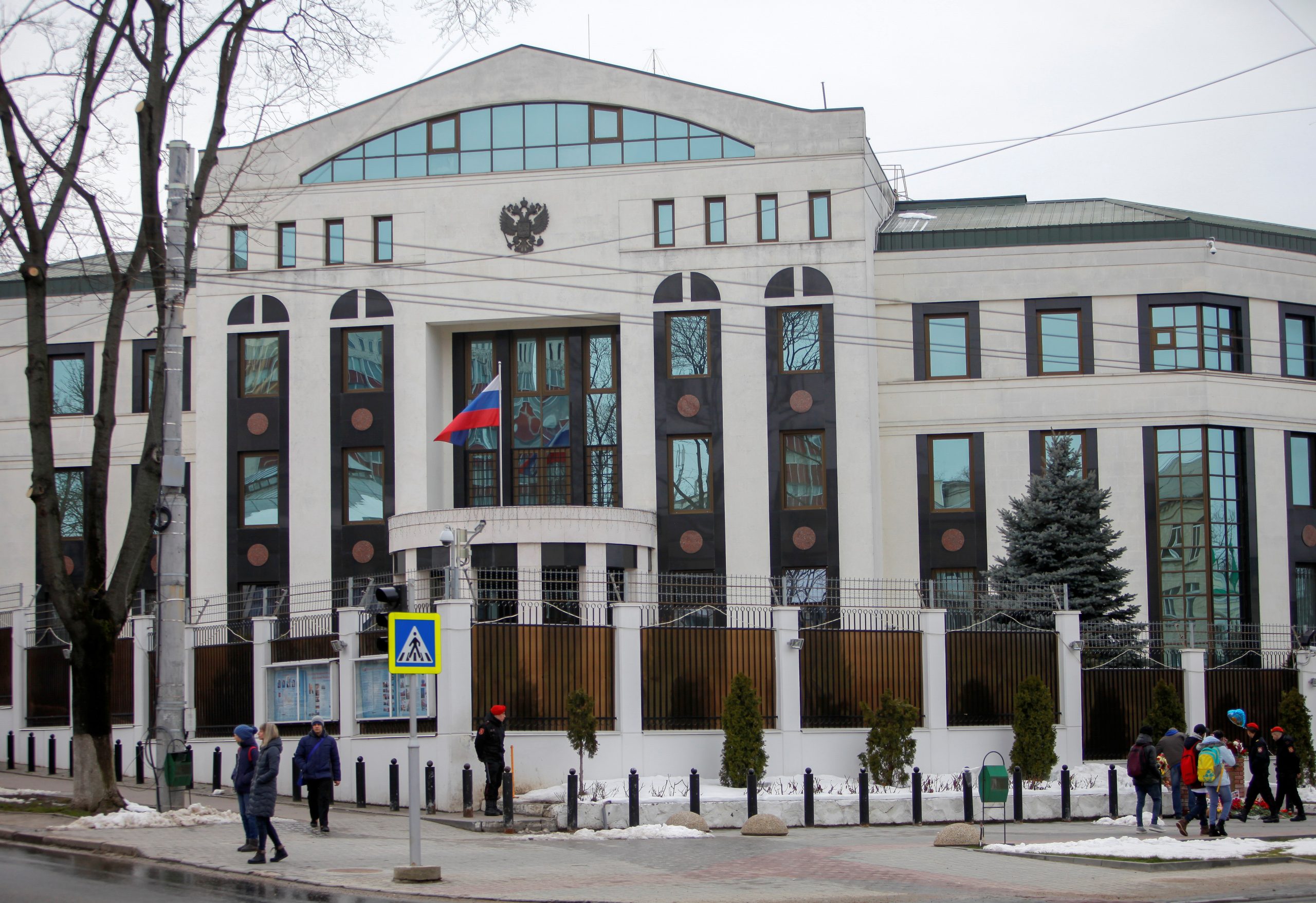
BANNER: A general view shows the Russian Embassy in Chisinau, Moldova, March 27, 2018. (Source: Reuters/Viktor Dimitrov)
The Kremlin’s response to the investigations around the proliferation of “spy antennas” on its embassy roof in Chisinau revealed its readiness to manipulate narratives and influence public opinion in Moldova. By downplaying the significance of the findings and attributing them to Western influence, Russia attempted to shape the narrative and divert attention away from its own activities in Moldova.
Diplomatic tensions between the Republic of Moldova and the Russian Federation increased after the July 2023 publication of a joint investigation by JurnalTV (Moldova) and TheInsider (Russia) about a suspiciously large number of antennas and transmitting devices on the roof of the Russian Embassy in Chisinau. The journalist reported a total of “28 dishes, masts, transmitting, and receiving devices installed on the rooftops of both the embassy itself and the neighboring building where diplomats and technical personnel reside.” According to the authors, that is nearly twice as many as on the Russian embassy in Brussels, Belgium, where many European Union offices and NATO personnel are located. Earlier, in April 2023, Vsquare published a comprehensive investigation on the vast network of “specialized equipment for signals intelligence (SIGINT)” on the roofs of Russian diplomatic buildings across Europe, noting at the time that the Russian embassy in Brussels had “the most spy antennas in Europe” at seventeen.
JurnalTV and TheInsider’s investigation uncovered Russian intelligence officers from the Main Intelligence Directorate (GRU) and Federal Security Service (SVR) operating these facilities. Journalists have further noted that embassy personnel responsible for overseeing the antenna network become particularly active, often seen on rooftops adjusting installations, especially during Moldovan elections and the visits of foreign delegations. According to the JurnalTV/The Insider investigation, for instance, Russian agents were observed on rooftops around the Gagauzia elections in May 2023 and before the European Political Community Summit on June 1, 2023, which coincided with a cyber attack that exposed sensitive government documents. While much of the discussion has referred to the equipment as “spy antennas” and visual cues can point to its likely application, without direct access to the equipment, its actual application – including whether it was used for any form of intelligence gathering – will remain unverified.
Following the release of the JurnalTV/The Insider report, the Moldovan government summoned the Russian ambassador to inform him that it had decided to reduce by two-thirds the number of diplomats and personnel at the Russian embassy in Chisinau. As a result, on August 15, 2023, eighteen Russian diplomats and twenty-seven technical embassy personnel left Moldova. According to a press release by the Moldovan Foreign Ministry, “this decision comes as a result of numerous unfriendly actions toward the Republic of Moldova, unrelated to diplomatic duties, as well as attempts to destabilize the internal situation in our country.”
The DFRLab analyzed the reaction of the Kremlin and its affiliated network in Moldova to the investigation’s allegations and conclusions. We identified attempts to shape public opinion through various channels, including on messaging app Telegram and short video platform TikTok. The deployed tactics diverted attention, downplayed the significance of the findings, and cast doubt on the credibility of the journalist who conducted the study.
Tactic 1: Deny everything, normalize the issue
Commenting on the matter, Russian Foreign Ministry spokesperson Maria Zakharova called the investigation “an opus, a fantasy story” that had nothing to do with reality.
After being summoned to the Ministry of Foreign Affairs, Russian Ambassador Oleg Vasnetsov stated that the antennas on the Russian Embassy in Chisinau were bought in Moldova in the 1990’s and had deteriorated due to rust. He denied allegations of espionage, attributing the numerous antennas to Moldova’s poor telecommunications infrastructure, suggesting that they would not need frequent replacements if telephone and internet services were more reliable. However, according to data from March 2023 on the online page cable.co.uk, Moldova ranks 36th in the global internet speed ranking, making it one of the quickest in Eastern Europe, while Russia is placed 62nd in the same list.
In an attempt to dilute the public discourse, pro-Kremlin media conducted a series of interviews with affiliated experts. On July 26, in an interview with political analyst Sergei Mishin broadcast on Sputnik Moldova and posted on its Telegram channel, Mishin questioned the mental health of the Moldovan leadership, who, according to him, “sees Russian spies and saboteurs everywhere. […] It feels like our [Moldovan] government is completely going crazy. Even psychiatrists cannot find a diagnosis.”
On the same day, the local branch of the daily Russian newspaper Komsomolskaya Pravda (Komsomol Truth) published an interview with Ion Mahu, a retired colonel and the president of the Mișcarea Populară “Salvăm Moldova” (Popular Movement “Save Moldova”), a local nongovernmental organization with open anti-Romanian, anti-European, and anti-NATO positions. Mahu tried to normalize the antennas’ presence by claiming it to be a common practice in all embassies worldwide. He also suggested that the Americans were more likely to be involved in espionage, pointing his finger at US Ambassador Kent D. Logsdon in particular: “Is that espionage equipment or not… we need to ask the Americans; they are the experts in this. US Ambassador to Moldova Kent D. Logsdon knows precisely what espionage equipment is and what is not!”
Tactic 2: Whataboutism (“others do it too!”)
The assertion that “others do it too” regarding placing multiple antennas on embassy roofs was swiftly adopted by pro-Russian Telegram channels. For example, Telegram channel Молдавский пистон (Moldavan Piston) suggested without any evidence that “the Americans have huge dishes the size of several houses, while Russia has smaller plates but with the same capacities.”
To prove the point that other embassies in Chisinau also possess antennas, Bogdan Tirdea, a socialist member of the parliament notorious for spreading propaganda and misinformation, shared a series of pictures on his Telegram channel. Despite the clear difference in the number of antennas at the Russian embassy compared to those at other embassies, Tirdea shifted the conversation by asserting that Western embassies also possess antennas. In the first post, he shared an image of the US Embassy in Chisinau, wherein two objects have been highlighted in red. He presumes these objects to be antennas. Tirdea accompanied the post with the following description “Why is US Ambassador Logsdon silent about antennas?”
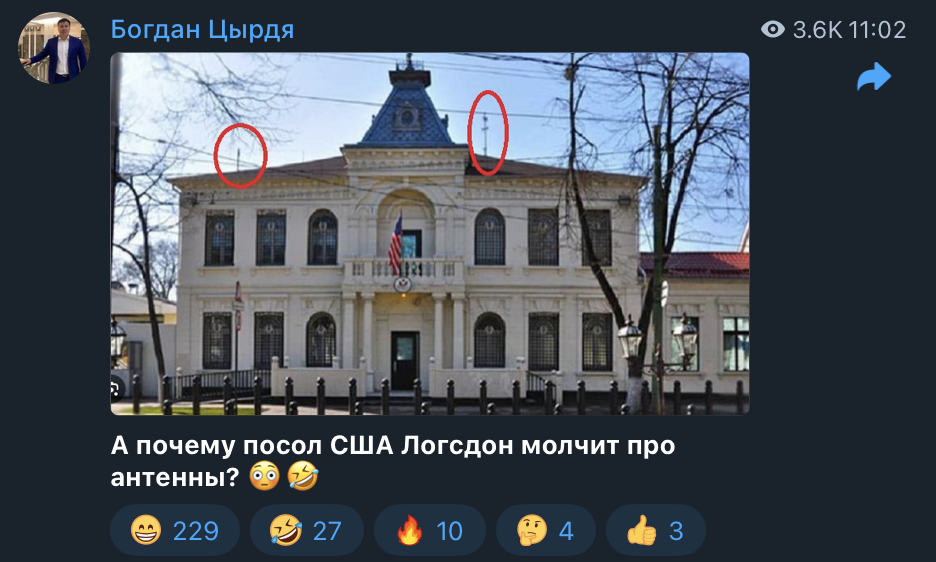
Tirdea’s second Telegram post annotated a years-old photo of the Romanian embassy, where, in a similar manner, a purported antenna has been marked in red, accompanied by a sarcastic comment that “the Romanian embassy in Chisinau also has no antennas.” (The photo most likely dates to 2019 or earlier, as the line outside the embassy is indicative of an election wherein Romanian voters would have queued outside the embassy to participate. The last such election took place in 2019.)
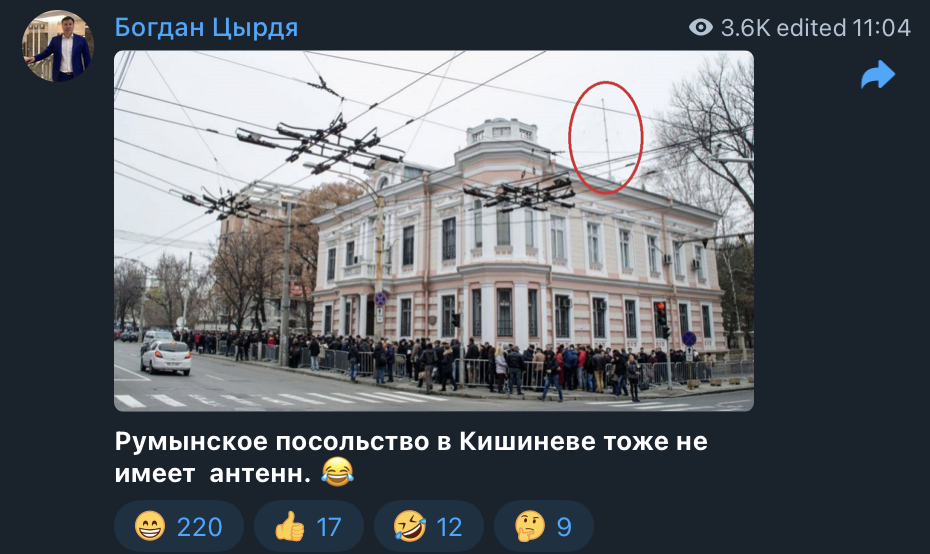
On Tirdea’s third Telegram post, which included a photo of the British Embassy in Chisinau, Tirdea again highlighted an object believed to be an antenna with a red circle and accompanied with an antagonistic whataboutism: “No way! The British Embassy also has antennas! God forbid our inadequate (authorities) will summon the ambassador.”
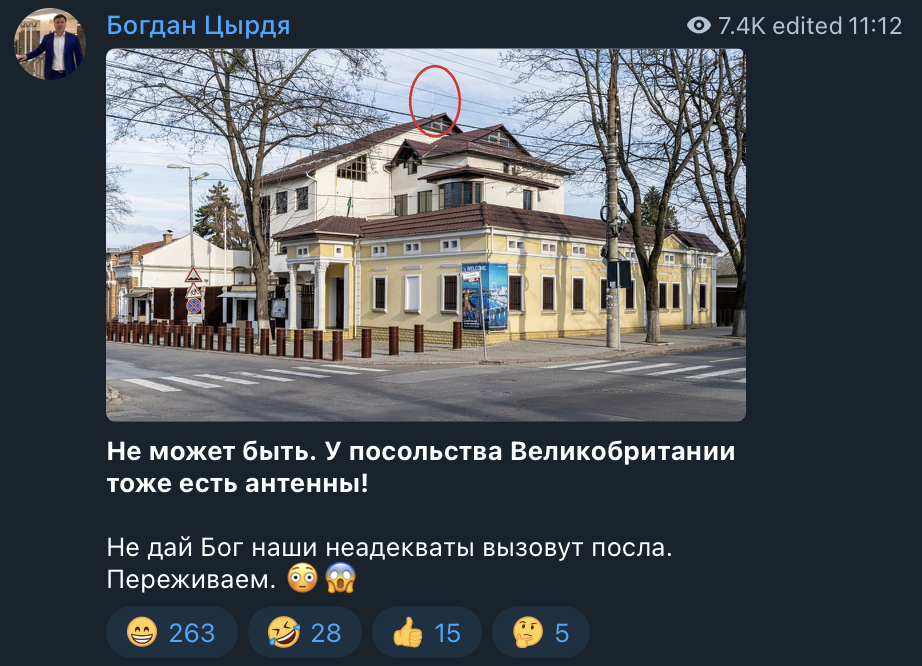
Tactic 3: Mockery
Another tactic used by Kremlin-linked outlets was to generate and spread memes designed to mock Moldovan authorities and make fun of the topic, using different social media platforms like Telegram, Facebook, YouTube, and TikTok. The most active in this regard was the WTF Moldova Telegram channel, which posted memes featuring Moldovan President Maia Sandu and Deputy Prime Minister Dumitru Alaiba wearing aluminum foil hats, a shorthand often used to portray people who have been driven irrationally crazy by a fear of antennas and associated radio waves.

In another Telegram post, WTF Moldova?! added a whirly beanie – a trope used to depict somebody as childish or simple – to an image of Speaker of Parliament Igor Grosu.

Memes on the topic were also shared by the Telegram channel mr. Buimistr, which is operated by journalist Dmitri Buimistru, who is known for hosting a satirical political show that targets pro-European parties. According to the information posted on the website of the Audiovisual Council, the public authority responsible for regulating the public and private audiovisual media in Moldova, Buimistru is Editor-in-Chief of TV9, a television channel affiliated with the pro-Russian Socialist Party. In a sarcastic post with the description “Shock! The Moldovan special services published a photo of a man adjusting the antenna on the roof of the Russian embassy!” Russian President Vladimir Putin is portrayed as holding binoculars. The image text says, “Move the plate, I want to see what the Moldovan authorities are doing there.”

On the July 28 episode of his show, “Вечерний Буймистру/ Late Buimistru,” Buimistru dedicated a segment to the antenna issue. In the episode, Buimistru featured a doctored image in which two Russian nationals – whom the United Kingdom alleges poisoned former Russian spy Sergei Skripal – inserted into the image of a kiosk in a mall selling antennas; by conflating the poisoning with the discussion around the antennas, the show is clearly trying to portray a trend of chronic overreaction by the West in response to Russia’s activities.

Buimistru’s show is broadcast on “Primul in Moldova,” a local TV channel rebroadcasting Russian Pervyi kanal programs that was formerly owned by the Socialist Party and is now reportedly controlled by fugitive oligarch Ilan Shor, who has reportedly orchestrated protests against Moldova’s pro-European government. It is one of the six channels whose license was suspended in December 2022 over accusations of spreading misinformation about Russia’s war in Ukraine and manipulating public opinion. Although it cannot broadcast on standard television, the channel livestreams on platforms like Facebook and YouTube. As of October 2, 2023, the episode featuring the discussion of the antenna dispute had garnered over 40,000 views on YouTube and more than 12,000 views, 1,000 reactions, and 200 shares on the show’s Facebook page.
Sarcastic videos on the antenna topic were also widely spread on TikTok with the intention of portraying the authorities’ decision to eject the Russian diplomats as absurd and illogical. For example, the TikTok channel nashamoldovasha, known for promoting pro-Russian narratives and for posting humorous sketches on political topics, uploaded a video mocking the antenna subject. The video garnered over 25,000 views.
Similarly, the TikTok channel ilia_cernisov, which is hosted by television personality Ilia Cernisov, posted two sarcastic videos insinuating humorously that the birds flying above the Russian embassy in Chisinau had started speaking in Russian and that the only solution against them is aluminum foil hats. His videos have been viewed cumulatively more than 30,000 times as of September 29, 2023. Cernisov achieved fame as a presenter for Русское радио/Russian radio and for RTR Moldova, which rebroadcasts programs from Russian state television channel Rossiya 1.
Tactic 4: Shift the blame (Westward)
Russian Foreign Ministry spokesperson Zakharova was the first to set the tone, saying that the real goal of the “stuffing” is “whipping up anti-Russian hysteria for new unfriendly actions of the Moldovan leadership towards Russia.”
The next day, Grigori Karasin, the head of Russia’s Federation Council Committee on International Affairs, insinuated on his Telegram channel that Moldova’s ejection of Russian diplomats and withdrawal from the CIS Parliamentary Assembly was not coincidental. He suggested that President Maia Sandu’s decisions aligned with the West’s unfriendly approach toward Russia.
There is nothing new about the Russian government’s claim that the Moldovan government follows Western orders. It is a common line of accusations that is actively promoted by pro-Russian politicians in Moldova. For instance, in multiple press appearances after the publication of the investigation, Moldova’s ex-president Igor Dodon accused the country’s current administration of making the decision “to please the West and be in the ‘trend.’”
In a comment provided on July 26 to Russian TASS media outlet and shared to his Telegram channel, Dodon declared that the decision to disrupt relations with Russia “based on dubious press publications” goes beyond common sense. He then stressed that “Maia Sandu and her party have engaged in a competition of Russophobia under the pressure of their Western handlers, who want to use our country and people as bargaining chips in their game against Russia.”
On July 28, during a broadcast of the show “ПО ФАКТАМ” с Юлией Федоровой” (“Facts with Yulia Fedorova”) on Exclusiv TV, Dodon made new claims that followed the same pattern, saying “based on some newspaper stories, they’re expelling diplomats and saying that some antennas are causing interference… What’s next, are they going to fight flying saucers, aliens that are already being talked about in the US Congress?” He also implied that the Moldovan authorities’ decision to expel diplomats was an effort to align with Western actions against Russia. “It’s clear that this decision by the authorities is meant to please the West,” Dodon said on air. (Exclusiv TV – on which Dodon made the claims – airs programs previously produced by NTV Moldova, which had its license suspended by Moldovan authorities for repeatedly violating the Code on Audio-visual Media Services.) Writing on his Facebook page, Ilan Shor made similar claims, accusing the Moldovan government of fabricating the story. Specifically, he wrote “Dear citizens, the longer the fascist regime of Maia Sandu persists, the fewer democratic elements remain in our country. Under the guise of various tall tales about ‘antennas, spies, and enemies of the people,’ this mob of lunatics from PAS [the majority party], led by a person full of hatred towards everything Moldovan, tramples upon all the principles that underlie the rule of law.”
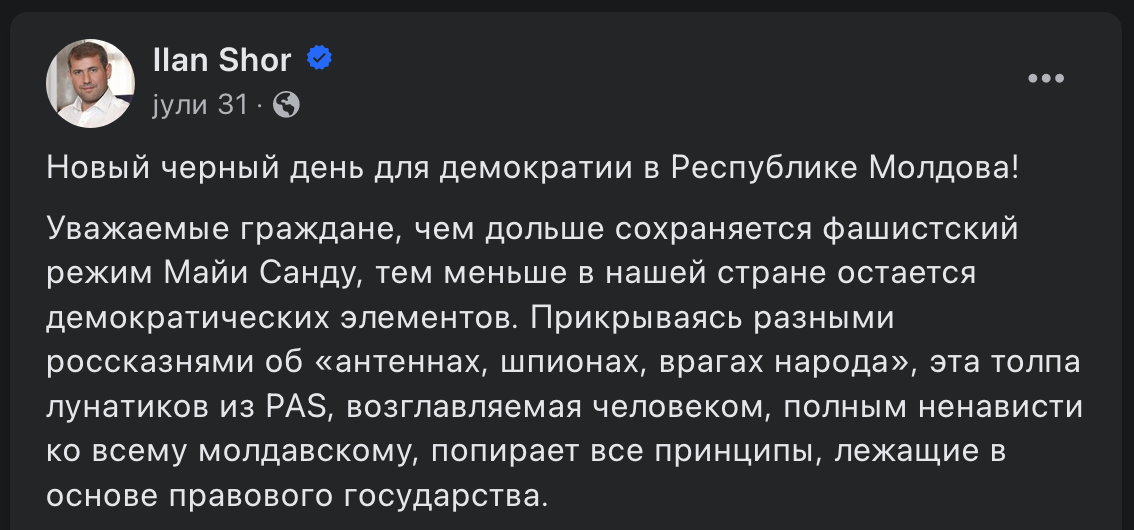
To further support the narrative that the West influenced Moldova’s decision, Sputnik Moldova’s Telegram channel shared a photo from the meeting between the US Ambassador to Moldova and Speaker of Parliament Grosu, highlighting that the meeting occurred immediately following Chisinau’s announcement to eject a number of Russian diplomats from Moldova. In a subsequent post, published a few hours later, Sputnik Moldova re-shared a post from the “Кружка Медная/ Krujka Mednaya” Telegram channel that mentioned that US Ambassador Logodon is “diligently inspecting government institutions,” providing directives and expressing appreciation for Moldovan authorities, “all without any antennas.” (Since the time of writing, Telegram has suspended the Sputnik Moldova Telegram channel for “violat[ing] local laws.”)

Alongside their accusations against Moldova and the West, pro-Kremlin Telegram channels have launched attacks on the credibility of the authors of the JurnalTV/The Insider investigation, alleging that they are operating under the influence of foreign intelligence services. For example, the Telegram channel for the Balkan Center published a post about the The Insider and Jurnal TV investigation, calling it “a rare schizophrenic publication.” The Balkan Center, which describes itself as “a center for analysis, research, and forecasting,” does not have an official website to track its activities. The Center has a Facebook page with 153 followers, on which the last post dates back to May 24, 2022. As of September 2023, its exclusive platform of operation is Telegram.
The Center’s Telegram post highlights supposed similarities between the JurnalTV/The Inside investigation and other investigations conducted by the Khodorkovsky Dossier Center. The Telegram post describes an alleged process for the leak of “insider information,” including the transfer of information from senior intelligence agencies to “junior colleagues.” Further, the Telegram post criticizes journalists and politicians for participating in such an information war and calls them “foot soldiers” in the information war.
Conclusion
The “spy antennas scandal” has not only raised concerns about the presence of transmitting devices on the Russian Embassy’s roof but has also revealed more about the information warfare that Russia is actively waging in Moldova. These activities extend beyond traditional diplomatic functions and reflect Russia’s keen interest in Moldovan affairs. The Kremlin’s response demonstrated a concerted effort to manipulate public opinion, employing a range of tactics to create confusion, minimize the seriousness of the allegations, and erode trust in investigative journalists. This multi-faceted approach reflects the complexity of the Russia information warfare, where narratives and perceptions can be as influential as facts themselves.
Cite this case study:
Victoria Olari, “The Kremlin and its proxies attempted to deflect the ‘spy antennas’ scandal in Moldova,” Digital Forensic Research Lab (DFRLab), November 30, 2023, https://dfrlab.org/2023/11/30/the-kremlin-and-its-proxies-attempted-to-deflect-the-spy-antennas-scandal-in-moldova/.

